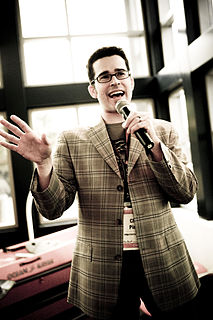A Quote by Shigeru Miyamoto
Originally, I wanted a machine that would cost $100. My idea was to spend nothing on the console technology so all the money could be spent on improving the interface and software. If we hadn't used NAND flash memory and other pricey parts, we might have succeeded.
Related Quotes
A technology becomes truly disruptive when it drives the marginal cost of something that used to be scarce and expensive to approach zero. Thus, it used to be to deploy software at scale, you had to fund a data center, buy a set of servers, storage, and networking gear, build an in-house IT management capability, and buy an expensive stack of enabling software before you could even get started. Now you can get all that from Amazon or Microsoft on a pay-as-you-grow model.
Contemporary technology could be used to eliminate ownership and management of corporations. It could be used to provide - lets say Apple computers. In principle information technology could be used to provide direct information to the work force on the ground so that they could democratically decide what the company would do, eliminating the role of management. It could be used for that. People aren't developing technology for that purpose.
I'm not of the opinion that all software will be open source software. There is certain software that fits a niche that is only useful to a particular company or person: for example, the software immediately behind a web site's user interface. But the vast majority of software is actually pretty generic.
The thing that's good about music-making software like the DAW-kinda systems is that they're all generally the same; the kind of interface is normally laid out in a similar way. Depending on the program, the sounds might be quite different, but they tend to all have a drum machine or synthesizer or a sampler.
I think from an economics point of view, it is important that the money that is spent for health care is well spent - what is the cost-effectiveness of the money that is used? - because if the money is well spent, many people benefit from the system, and it is also a good market for finding employment. I do not see a reason why we should limit ourselves when it comes to very qualified and humane employment opportunities if there is no waste and if there is medical need.
If we were to go back in time 100 years and ask a farmer what he'd like if he could have anything, he'd probably say he wanted a horse that was twice as strong and ate half as many oats. He would not say he wanted a tractor. The point is, technology changes things so fast that many people aren't sure what the best solutions to their problems might be.
I don't like when I see bands that are just a memory of what they used to be, and there's a few out there that I've seen recently that are still touring... I'm not gonna name them, but some of the members can barely play their parts, and then they have a lot of other members that weren't even originally in the band.
I am extraordinarily fascinated by the future of technology. We are in the early infancy of technology, and we have an opportunity to guide how technology develops and integrates into our lives. I talk a lot about the 'invisible interface,' or the idea that we can utilize technology without being absorbed into a screen.
At one time, I hated the iPhone - but that was only before I used one for the first time. Now, it would be difficult for me to make the switch to any other platform. I've spent a fair amount of money on apps that continue to ride with me as I upgrade my iS devices. The iPhone certainly has its share of flaws and shortcomings, but having spent a great deal of time with other devices that claim to be "killer" continue to fall short. The industry needs competition, but I just need my mobile communications computer to work with a healthy array of software.
Josh, my question to you is why you ran against a Republican and spent $100,000, wasted $100,000, that could have been spent on the west side of the state getting us a majority in the House of Representatives, especially since, at least in two of those swing districts we probably could win with that $100,00








































